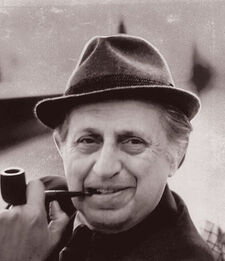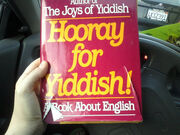
Leo Rosten.
Leo Calvin Rosten (April 11, 1908 - February 19, 1997) was a Jewish-American writer. Rosten was born in Lodz, now part of Poland but a part of the Tsarist Russian Empire at the time of his birth, and died in New York City.
Rosten was a teacher and academic but is better known as a scriptwriter, novelist and humorist. One of his most famous works is, The Joys of Yiddish, a book which takes a light-hearted look at the impact that Yiddish has had on the English language.
Writing career[]

Hooray for Yiddish! A Book about English by Leo Rosten
Rosten had a successful career as a screenwriter, being involved in the writing of fifteen movies and television programs between 1941 and 1963, sometimes using the pseudonym, Leonard Q. Ross.
It was also under the name Leonard Q. Ross that Rosten originally wrote the humorous stories about Hyman Kaplan, who always writes his name in colored crayon as H*Y*M*A*N K*A*P*L*A*N. Kaplan is an immigrant to the United States, a Yiddish-speaker from Kiev who is learning English at night school. The stories first appeared in the magazine, The New Yorker in the 1930s and were later reprinted in two volumes as The Education of H*Y*M*A*N K*A*P*L*A*N and The Return of H*Y*M*A*N K*A*P*L*A*N. In 1976 the two books about Hyman Kaplan were reissued in one volume called, O K*A*P*L*A*N! My K*A*P*L*A*N!, Rosten made several changes to the stories for the 1976 book, opinion is divided amongst readers as to whether or not those changes were improvements.
Rosten is perhaps best known internationally for his 1968 book, The Joys of Yiddish. Rosten states at the beginning of the book that it is not a text book for learners of Yiddish or a scholarly study of the language. It is instead a list of Yiddish words that have been used in English. It is notable for the fact that Rosten uses at least one proverb, anecdote or joke to demonstrate the meaning of nearly every listed word. The Joys of Yiddish has therefore become a favorite title amongst connoiseurs of Jewish humor.
Famous quote[]
As a young man, a reportedly nervous Leo Rosten introduced the famous comedian, W.C. Fields, at a dinner held in his honor, by saying, "Anyone who hates babies and dogs can't be all bad". This description of W.C. Fields' perceived personality has often been mistakenly attributed to Fields himself.
Personal life[]
Rosten was married twice. In 1935 he married Priscilla Ann Mead (1911-1959), the sister of anthropologist, Margaret Mead. The marriage ended in divorce. In 1960 he married Gertrude Zimmerman (1915-1995). Rosten had two two daughters and a son from his first marriage and six grandchildren. His granddaughter, Carrie Rosten, is also a writer, having had three books published, including the young adult novel, Chloe Leiberman (Sometimes Wong).
Bibliography[]
- The Education of H*Y*M*A*N K*A*P*L*A*N (1930s) (as Leonard Q. Ross)
- The Return of H*Y*M*A*N K*A*P*L*A*N (1930s) (as Leonard Q. Ross)
- All Through the Night (1941) (story) (as Leonard Q. Ross)
- They Got Me Covered (1943) (story) (as Leonard Q. Ross)
- Mechanized Patrolling (1943) (as Leonard Q. Ross)
- The Conspirators (1944) (screenplay)
- The Dark Corner (1946) (story)
- Lured (1947)
- Sleep, My Love (1948) (novel) (screenplay)
- The Velvet Touch (1948)
- Double Dynamite (1951) (story)
- Walk East on Beacon! (1952)
- Mister Cory (1957) (story)
- Leo Rosten Bedside Book (1962)
- Captain Newman, M.D. (1963) (novel)
- The Joys of Yiddish (1968)
- People I Have Loved, Known or Admired (1970)
- A Most Private Intrigue (1970)
- Rome Wasn't Burned In a Day: The Mischief of Language (1972)
- Home is where to learn how to hate (1973)
- A Trumpet for Reason (1974)
- The Washington Correspondents (Politics and People) (1974)
- Dear (1975)
- The Cook Book (1975)
- Religions of America (1975)
- Hollywood: Movie Colony the Movie Makers (1975)
- Dear Herm (1975)
- O K*A*P*L*A*N! My K*A*P*L*A*N! (1976)
- The 3:10 to anywhere (1976)
- Look Book (1976)
- Leo Rosten's Treasury of Jewish Quotations (1977)
- The Power of Positive Nonsense
- Passions & Prejudices: Or, Some of My Best Friends Are People (1978)
- Silky. A Detective Story (1979)
- Infinite Riches (1979)
- King Silky (1981)
- Hooray for Yiddish: A Book About English
- Giant Book of Laughter (1985)
- Leo Rosten's Book of Laughter (1986)
- Hebrew-English Lexicon of the Bible (1987)
- The Joys of Yinglish (1988)
- Leo Rosten's Giant Book of Laugh (1989)
- Leo Rosten's Carnival of Wit: From Aristotle to Woody Allen (1996)
External links[]
- Leo Rosten at the Internet Movie Database
- Quotes from Leo Rosten at BrainyQuote.com
- Wikiquote's collection of Leo Rosten's quotes
- Wikipedia article about H*YM*A*N K*A*P*L*A*N, a fictional character created by Leo Rosten
- From the New York Times, Leo Rosten, a Writer Who Helped Yiddish Make Its Way Into English, Is Dead at 88 By Margalit Fox